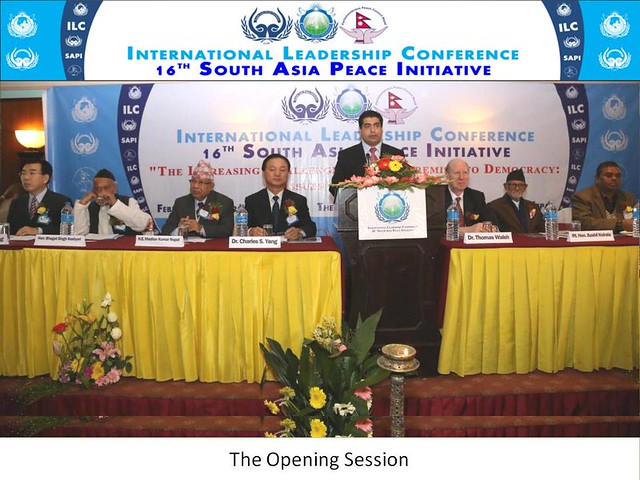Kathmandu, Nepal — The Prime Minister of Nepal, H.E. Sushil Koirala, said that his government would support the call of the late Dr. Sun Myung Moon, the founder of UPF, for an interreligious council at the United Nations.
The prime minister spoke on the occasion of the 16th South Asia Peace Initiative (SAPI) conference, which was held under the theme “The Increasing Challenges from Extremism to Democracy: Issues and Responses.” It took place on Feb. 20 and 21, 2015, at the Malla Hotel in Kathmandu.
"Nepal is deeply concerned about the spread of militant extremism and religious fundamentalism‚ and condemns them in all its forms and manifestations‚ whenever and wherever they happen,” the prime minister said.
The conference, organized by UPF-Nepal together with the Parliamentarians Peace Council, a coalition of Nepalese lawmakers from all political persuasions, was attended by 310 people from 17 nations, including 27 current members of Parliament from four nations.
In the Opening Session former Nepalese Prime Minister H.E. Madhav Kumar Nepal reminded the participants that overcoming extremism was a shared responsibility. He then praised the activities of UPF in its role as an NGO supporting the ongoing peace process in Nepal.
Hon. Upendra Yadav, a former deputy prime minister and former foreign affairs minister, emphasized that democracy must be inclusive. The bedrock of a functioning democracy, he said, was recognizing marginalized groups and integrating them into society.
Hon. Bhagat Singh Koshyari, a member of the Lok Sabha, India’s lower house of Parliament, and the former chief minister of India’s northern Uttarakhand state, praised UPF and SAPI for their conscientious efforts to establish peace, not only between nations but also in our day-to-day lives. The culture of South Asia, which craves peace, he noted, gave birth to both Buddha and Gandhi.
Dr. Thomas G. Walsh, president of UPF International, explained that a democracy, which functions according to “rule by the people,” is only as good as its people. He continued by saying that social capital was essential for peace and development, and this included such elements as religious feeling, industriousness, honesty, and healthy marriages and strong families.
Dr. Charles S. Yang, chairman of UPF International, called moral corruption an obstacle to peace, saying, “We cannot build world peace when free sex is the norm. Families, societies or nations that practice free sex will ultimately collapse.” He then invited the guests to the Multicultural Family Educational Peace Festival that was scheduled to take place at Nepal’s National Stadium in Kathmandu the following day.
After welcoming the guests, Dr. Chung Sik Yong, chairman of UPF Asia, clarified the dangers of extremism, which he said was actually “selfish-ism.” Dr. Yong explained, “[Extremism] is harmful and destructive because it does not care about others but only about itself, and can do anything to accomplish its selfish goals.” To make his point he said, “All religions teach that selfishness is wrong and that living for others is good.”
The chairman of UPF-Nepal and founder of the Parliamentarians Peace Council, Hon. Ek Nath Dhakal, chaired the session.
There were six sessions with 30 speakers during the one-and-a-half-day conference. The conference concluded on Feb. 21 as participants attended the Multicultural Family Educational Peace Festival at Kathmandu’s National Stadium which drew 70,000 people.
A nine-point resolution was issued which, in part, stated that the challenge of extremism can be overcome only through the combined efforts of government, civil society, educational institutions, religions, the media and the family.
For a report in ekantipur.com, click here.
RESOLUTION
Assembled at an International Leadership Conference from all parts of the world, for the promotion of peace on earth and goodwill among men and women, the South Asia Peace Initiative, held in Kathmandu, Nepal, from February 20 to 21, 2015, focused on “The Increasing Challenges from Extremism to Democracy: Issues and Responses,” and resolved that the challenge can be overcome only through combined efforts at the level of government, civil society, educational institutions, the media and the family. We regard it as a duty to ourselves, to the cause which we love, to the country in which we live, and to the world, to adopt concrete resolutions to guard against that. We resolve to:
- Strengthen the role of education and family in inculcating values of respect and understanding of other religions, cultures, nationalities and geographies.
- Build a consensus on major threats and challenges arising out of extremism, current developments and circumstances and to commit ourselves to translating that consensus into concrete action, including addressing the root causes of those threats and challenges with resolve and determination.
- Dedicate ourselves to building an atmosphere in which governments, civil society groups, media and business work together to convert national borders into bridges of friendship and opportunities rather than barriers between peoples.
- Commit ourselves to advancing human welfare, freedom and progress everywhere, as well as to encouraging tolerance, respect, dialogue and cooperation among different cultures, civilizations and peoples to promote international peace and security.
- Raise awareness among representatives of ministries of education and of local authorities on the importance of incorporating Peace Education into school and university curricula, as they can influence both local communities and the wider public.
- Mobilize and galvanize the youth, teachers, universities, private institutions and other civil society organizations on a trans-border basis for interdisciplinary approaches to general and peace-related education.
- Foster cooperation of teachers, trainers and institutions dedicated to Peace Education by forming both micro and macro groups and increase global cooperation among teachers, between teachers and NGOs (including networks) working on the topic.
- Commit ourselves to protecting freedom of expression as the centerpiece of democracy while respecting all sensitivities.
- Organize conferences, interactions and exchanges to promote understanding and collaboration among all stakeholders.
Profound thanks go to all delegates for their views, cooperation and input.

